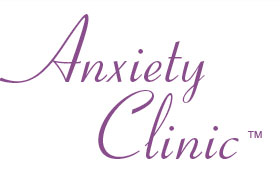What is anxiety?
What is anxiety and how can you overcome it?
We are often asked - What is anxiety? The best way to explain what anxiety is, would be to approach it from various perspectives. In order to understand what anxiety is, we also need to understand why we experience anxiety, what the symptoms of anxiety are, how anxiety is created, how anxiety works, and perhaps most importantly of all - how can you overcome anxiety?
If you've already done your research and are looking for help in overcoming anxiety, you should go straight to our treatment page.
Why do we experience anxiety?
Anxiety is an emotional response to a potentially difficult, challenging or threatening situation. In such a situation the mind signals the body to become temporarily more alert, stronger and faster in order to best deal with whatever you are facing. Thus feeling anxious in the presence of a guard dog not only focuses your attention upon the potential threat but also causes you to become physically prepared to fight or make a run for it should things turn nasty. Another example could be if you were to awaken to find your home was on fire. The anxiety would instantly focus your attention on the danger and the physical changes within your body would give you the best chance of escaping.
Thus experiencing anxiety at appropriate times is at least a benefit and could potentially be a life-saver.
However, if you're searching for anxiety on the internet it's reasonable to assume that it has become a problem for you. Anxiety becomes a problem when it fires repeatedly at inappropriate times. The heightened awareness anxiety generates can be both physically and mentally debilitating when it occurs on a regular basis. This leads to anxiety symptoms.
What are the symptoms of anxiety?
Anxiety symptoms are the psychological and physiological manifestations created by inappropriate (and habitual) anxiety episodes. We'll go into more detail with respect to specifically how anxiety is created, but for now we'll focus on the most common anxiety symptoms.
Unexplained aching in the muscles
General muscle tension
Unexplained back or shoulder pain
Tightness in the chest
Pounding heart or palpitations
Bouts of unusual sweating
General tiredness and physical lethargy
Loss of sex drive
Dizziness or feeling light headed
A feeling of physical detachment (like you’re not in your own body)
Nausea
Numbness or pins & needles
Stiff neck
Dry mouth
Night Sweats
Bowel dysfunction - IBS / Constipation / Diarrhoea
Stomach ache / Stomach bloating
Poor quality sleep
Tiredness in the day / Difficulty sleeping at night
How anxiety is created - The truth...

One of the toughest challenges facing any anxiety sufferer is understanding how their anxiety is being created. We are programmed as humans to focus on certain things and to ignore others... and this is very true of anxiety particularly with respect to it being a disorder.
Let's say for example that you're not a big fan of going to the dentist. You notice on your calendar that you're due to go for a dental appointment later in the month - let's say in three weeks time. You contemplate what may happen at the dentist (drills, needles, fillings, extractions, pain, embarrassment) and begin to feel anxious. You dwell on the possibilities and progressively feel worse.
A week passes and you notice once more on your calendar that you're due for the dental appointment, but now you're a week closer. Once again you speculate what could go wrong and as before you begin to feel anxious. The more you dwell, the worse you feel.
Over the next two weeks you find intrusive thoughts appearing in your head over and over - it's almost like you can't think of anything but your upcoming dental appointment. Every thought is about what may happen and what could go wrong.
Finally the day of the appointment finally arrives. You are mentally exhausted and feel physically sick at the thought of going. Now remember you've not actually arrived at the dentists surgery yet - but you've had three weeks of suffering AND you're feeling terrible before you even arrive. What is going on?
The trap anxiety sufferers fall into is that they blame the dental appointment for them feeling bad. It's because of the dentist! However, in reality (in this example) you've not actually been to the dentists - yet you've suffered with three weeks of anxiety. How can it possibly because of the dentist?
The truth is that anxiety isn't caused by external things like dentists, appointments, interviews or public speaking. Anxiety is always created by thought process. The good news is that although in reality you can't change things like fillings, needles and drills - you can (with a little help) change how your thought processes work.
A professional example we could give is a client who was dental-phobic and required tranquilisers to even attend a checkup appointment. Unfortunately she developed an abscess and needed a complex extraction procedure in the very near future. She came to see us and we worked with her thought processes regarding how she perceived the dentist and the upcoming work. It took several hours but following that she said she felt fine about going for the appointment - as opposed to crying hysterically at the mere thought of the dentist earlier that day.
A week or so later we received a phone call from her saying that she not only hadn't worried about going for the appointment, but during the procedure she was completely calm and relaxed... even when the dentist told her he was struggling and she may need to be admitted to hospital for surgery! Fortunately, things turned out OK and the dentist managed the extraction himself. He commented at the end of the procedure how calm the lady had been throughout as he was used to her being tearful even when on tranquilisers.
The moral or the story is essentially that you can't change reality. However, having said that - reality is rarely the problem. It is our perception of reality through our thought processes which create fear and anxiety. Once you've learned how to crack that - your life becomes so much easier.
The truth about how anxiety works

If we go back to our initial example about you worrying (three weeks in advance) about an upcoming dental appointment you'll recall that at some point unsolicited thoughts with respect to the appointment were appearing in your head. Now, if you don't get worry thoughts about stuff you don't want to happen - you don't have anxiety and you're on the wrong website. However, if you do get unsolicited thoughts about things you don't want to happen, nod to yourself now...
So where do the unsolicited thoughts come from?
Many anxiety sufferers have experienced unsolicited thoughts for years - but we've yet to meet a single one that has sat down and asked themselves where these thoughts come from. However, we have some good news - we're going to explain where they come from and why.
Let's start by asking a simple question - "How do you know when something is important?" Take a moment to have a think about that before reading on.
Now, think about what happens when your phone rings or when you hear a baby crying. Do you feel a sense of urgency to act? If you woke up and found your house was on fire - would you feel a sense of urgency to get out?
On the other hand let's consider some things many people consider unimportant. Maybe emptying the bin, washing the dishes, erecting some shelves or filling in that tax return could be some examples you relate to. However for these examples there's no gut feeling.
Humans use emotional responses as a sort of importance barometer. The more intense the emotional response, the more important the thought or event is considered to be.
The mind uses a very basic filing system for thoughts and experiences. If a thought or experience has little or no emotional attachment - the mind considers it to be unimportant and either files it in the murky depths or deletes it completely. If you're wondering why dull or monotonous things are difficult to remember - there's your answer. However, at the other end of the spectrum we have thoughts and events with highly charged emotional responses attached to them. The mind considers these to be important and stores them right at the top of the filing pile. Again, from your own experience do you find emotionally charged memories easier to recall?
Now, the mind is basically a thinking machine and a thought generator. It is there to run the automated stuff in your body (digestion, heartbeat, blood pressure, cell renewal, temperature regulation, etc) and also to generate thoughts. For thought generation there are two types - first you have associated thoughts, so you may be watching TV and an advert for coffee comes on and your mind reminds you that you are low on coffee and need to buy some. The second type of thoughts are unsolicited, which tend to be random and unpleasant. These unsolicited thoughts drive not only your anxiety, but all anxiety disorders!
Although the unsolicited thoughts can appear to be random (having no obvious outside stimulus), they are actually driven by a very simple structure. Remember that the mind files the highly charged thoughts and memories at the top of the filing pile... well that's also where it gets the unsolicited thoughts from. Think about it now. The habitual unsolicited (anxious) thoughts you get - are they often things you've felt anxious about before? Your mind is just recycling what it believes is important to you... so it's bringing those thoughts to your attention over and over.
Each time an anxious thought gets recycled, you feel anxious about it all over again. The brain marks it as important (again), files it at the top of the pile (again) and then brings it back to your attention later... and the cycle continues.
Overcoming anxiety - The options
The first option is to do nothing and hope the problem will go away on its own. However, we've already discussed how anxiety works through a self-perpetuating cycle and if we're realistic in our expectation, spontaneous recovery is not only unlikely but the cycle could progress and become considerably worse.
The second option is to take medication, although before you commit to that perhaps you should consider where the anxiety is really coming from. If you firmly believe you get anxiety due to a lack of medication in your life - then maybe it could be a solution for you. However, if you live in reality you'll realise that medication simply suppresses the issue (rather than dealing with it) by sweeping it under the carpet. With this in mind you should also consider whether you'll have to stay on medication for the rest of your life or whether you're prepared to face the consequences of coming off it and having your anxiety potentially return with a vengeance.
Another question to ask yourself is why are GP's so keen to dish out anti-anxiety and anti-depressant medication? The answer is simply that it can be done conveniently (for them) in a standard seven minute appointment slot. The GP gets paid for the appointment and you become dependant on the drugs (so your GP gets paid again every month for repeat prescriptions). In due course your GP calls you in for medication reviews (for which they get paid yet again) and they know all along that the medication wont address the underlying cause of the anxiety. Your problem essentially becomes their cash cow. Priceless isn't it?
Option three is to sort out the problem properly. This involves addressing the underlying cause, which as we've discussed is the habitual cycle of anxious thoughts you've become trapped in. Results can be achieved within a matter of weeks with only moderate (but persistent) effort on your part. The information and techniques you need to understand are both simple and straightforward and your recovery will be directly proportional to the effort you put in. Thus if you're fed up with suffering and are prepared to do something about it - the solution is right in front of you. Now what are you going to do?.
How to overcome YOUR anxiety...

We've worked with anxiety sufferers for over fifteen years at our Anxiety Clinic. We deal with all types of anxiety including specific anxiety disorders such as, anxiety attacks (panic attacks), eating disorders, OCD, body dysmorphic disorder, social anxiety disorder, generalised anxiety disorder and post traumatic stress disorder. Whether your case is crushing, mildly inconvenient or anything in between - we can help you overcome it.
Remember that our clients are ordinary people just like you. The only difference is that each of our existing clients has taken positive action to help themselves. This places you at a sort of decision junction. Do you press on browsing the internet hoping for a magic bullet, risk taking drugs for the rest of your life or do you make the decision to do something to help yourself right now?
If you live in or near Staffordshire we'd be delighted to work with you face to face at our Clinic. However, if you live further afield we can still work together through our Online Consultancy service. The following links contain information on our fees, how long treatment takes and details of our money back satisfaction guarantee:
I'm interested in Face to Face Consultations (In Staffordshire)







